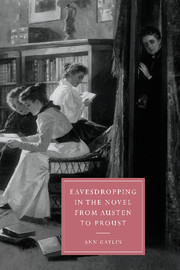Book contents
- Frontmatter
- Contents
- Acknowledgments
- Introduction
- 1 I'm all ears: Pride and Prejudice, or the story behind the story
- 2 Eavesdropping and the gentle art of Persuasion
- 3 Household words: Balzac's and Dickens's domestic spaces
- 4 The madwoman outside the attic: eavesdropping and narrative agency in The Woman in White
- 5 La double entente: eavesdropping and identity in A la recherche du temps perdu
- Conclusion: covert listeners and secret agents
- Notes
- Select bibliography
- Index
3 - Household words: Balzac's and Dickens's domestic spaces
Published online by Cambridge University Press: 22 September 2009
- Frontmatter
- Contents
- Acknowledgments
- Introduction
- 1 I'm all ears: Pride and Prejudice, or the story behind the story
- 2 Eavesdropping and the gentle art of Persuasion
- 3 Household words: Balzac's and Dickens's domestic spaces
- 4 The madwoman outside the attic: eavesdropping and narrative agency in The Woman in White
- 5 La double entente: eavesdropping and identity in A la recherche du temps perdu
- Conclusion: covert listeners and secret agents
- Notes
- Select bibliography
- Index
Summary
Un tour de clé ou un verrou poussé, et la vie intime de famille doit pouvoir être inviolable dans sa citadelle, qui est la chambre et ses dépendances.
Julien GuadetL'architecture est l'expression des moeurs.
Balzac, La Fausse MaîtresseA Paris, où les pavés ont des oreilles, où les portes ont une langue, où les barreaux des fenêtres ont des yeux, rien n'est plus dangereux que de causer devant les portes cochères. Les derniers mots qu'on se dit là, et qui sont à la conversation ce qu'un post-scriptum est à une lettre, contiennent des indiscrétions aussi dangereuses pour ceux qui les laissent écouter que pour ceux qui les recueillent.
Balzac, Le Cousin PonsThe nineteenth century has been called the “golden age of private life, a time when the vocabulary and reality of private life took shape.” As Jürgen Habermas and Richard Sennett, among others, have pointed out, the emergence of the bourgeois public sphere at the end of the eighteenth century in England and France produced its intimate, interconnected opposite, the private sphere, a necessary corollary to the concept of a civil society distinct from the state and its institutions. Concomitant with the concepts of the individual and of privacy, the middle classes formed a sense of the family as the center of private life, a life seemingly removed and a solace from the public world of politics, business, and its pressures.
- Type
- Chapter
- Information
- Eavesdropping in the Novel from Austen to Proust , pp. 58 - 112Publisher: Cambridge University PressPrint publication year: 2003

